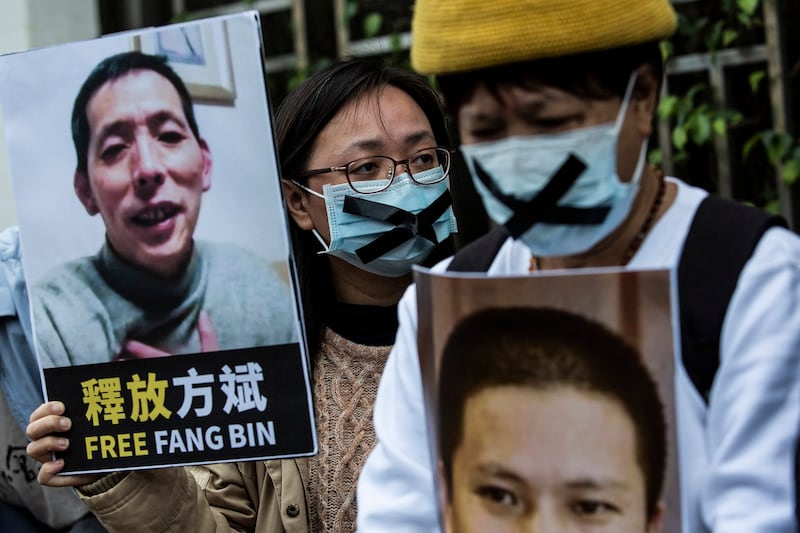Officials at the highest level of the Chinese Communist Party's law enforcement arm ordered a court in the central city of Wuhan to drop subversion charges against citizen journalist Fang Bin and to keep his trial quiet to avoid international media attention, leaked documents show.
Fang, who disappeared for three years after filming from hospitals and funeral homes early in the COVID-19 pandemic from the city of Wuhan, was sentenced in secret to three years in prison, Radio Free Asia reported last week.
Now, documents released online and verified by people familiar with the case have revealed the source of that decision – the Central Political and Legal Affairs Commission in Beijing, the ruling party's law enforcement arm.
According to one secret document titled "Special Report of the Political and Legal Affairs Commission of the Central Committee of the Communist Party of China," the Wuhan court that tried and sentenced Fang in secret was following orders from the very top.
It also reveals that Fang was found guilty of "picking quarrels and stirring up trouble," for "publishing false information through giving interviews to foreign media and shooting videos" after top officials rejected "subversion" charges to avoid hitting international headlines.
Both charges are frequently used to target peaceful critics of the regime.
‘Man-made disaster’
Fang, who is scheduled for release on April 30, was among a number of high-profile bloggers who tried to report on the emerging and little-understood viral outbreak from Wuhan. His reports described the pandemic as a "man-made" disaster, calling on people to resist government "tyranny."
He went incommunicado after a Feb. 1, 2020, livestream from Wuhan healthcare facilities, and made a couple more videos in the days that followed about his interrogation by police, before falling silent for three years, with no news of his fate.

The secret document is dated April 7, 2022, and signed by commission member Chen Yixin, and includes the opinion that Fang's actions constituted "incitement to subvert state power."
It also orders local authorities to ensure that his prosecution wasn't "used by hostile forces" – a reference to international media organizations and foreign governments – and rejects the charge of "incitement to subvert state power" in a bid to "de-politicize" Fang's case. It also orders a jail term of three years, which is what Fang received.
A person in Wuhan familiar with the case confirmed that the documents were genuine, and said the city's judiciary had leaked them to show that Fang's sentencing – and the secrecy with which his case was handled – was out of their hands.
"They wanted it to be known that they didn't deliberately withhold the verdict," the person said, referring to the fact that Fang's family weren't informed of the charges against him.
"The behind-the-scenes tussling over this is very complicated," the person said, adding that Fang was placed under residential surveillance by police on Feb. 9, 2020, and not sentenced until the following year.
32 YouTube videos
A second document – an Aug. 26, 2022, judgment issued by the Wuhan Intermediate People's Court rejecting Fang's appeal of the original sentence from a district-level court – was released online by the Weiquanwang rights website.
It shows that the prosecution's case against Fang was based on 32 YouTube videos posted from Feb. 4-8, 2020, which garnered hundreds of thousands of views.
"The court finds that the defendant, Fang Bin, fabricated false information, disseminated it on the internet, causing disturbances and serious confusion in public order," the judgment reads. "[He] is sentenced to three years in prison for the crime of picking quarrels and stirring up trouble."
The person familiar with the case said it was no accident that the documents appeared online shortly before Fang is due to be released.
Rights activist Lin Shengliang, who was the first to receive the leaked documents and confirmed their authenticity to Radio Free Asia, said there is a group of people within the judicial system in Wuhan who are unhappy with the system itself.
"This was the action of a group of insiders, people inside the system who are unhappy with it," Lin said. "They are leaking this to the public as a way of passing the buck."
Translated by Luisetta Mudie. Edited by Malcolm Foster.
